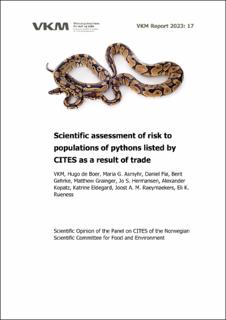| dc.contributor.author | de Boer, Hugo | |
| dc.contributor.author | Asmyhr, Maria Gulbrandsen | |
| dc.contributor.author | Flø, Daniel | |
| dc.contributor.author | Gehrke, Berit | |
| dc.contributor.author | Grainger, Matthew | |
| dc.contributor.author | Hermansen, Jo Skeie | |
| dc.contributor.author | Kopatz, Alexander | |
| dc.contributor.author | Eldegard, Katrine | |
| dc.contributor.author | Raeymaekers, Joost Andre M | |
| dc.contributor.author | Rueness, Eli Knispel | |
| dc.date.accessioned | 2024-01-22T09:24:19Z | |
| dc.date.available | 2024-01-22T09:24:19Z | |
| dc.date.created | 2023-06-15T13:56:29Z | |
| dc.date.issued | 2023 | |
| dc.identifier.citation | VKM Report. 2023, 17 1-115. | |
| dc.identifier.issn | 2535-4019 | |
| dc.identifier.uri | https://hdl.handle.net/11250/3112984 | |
| dc.description.abstract | This report provides a scientific risk assessment of the effects that international trade in selected species of pythons (Pythonidae spp.) and python products may have on populations of these species. The assessment is based on the criteria given under the Convention on International Trade in Endangered Species of Wild Fauna and Flora (CITES). The risk assessment is limited to species in the genera Apodora, Aspidites, Liasis, Malayopython, Morelia, and Python imported/exported to/from Norway since 2010 (ToR §3). Risk assessments to determine species-specific detriment (cf. Res. Conf. 16.7 (Rev. CoP17) Non-detriment findings) were made for 17 species using a standardized approach. Significant data gaps affected the degree of uncertaintyassociated with the assessments. Data gaps are mostly related to populations, trends, and illegal trade. Population and trade data for many species was more than a decade old and might therefore not reflect the current situation for these species. Based on the species-specific detriment assessments VKM concludes no detriment for 12 species (Apodora papuana, Aspidites melanocephalus, Liasis mackloti, Malayopython reticulatus, Morelia bredli, Morelia spilota, Morelia viridis, Python anchietae, Python bivittatus, Python breitensteini, Python brongersmai, Python curtus). For one species, VKM concludes detriment (Morelia boeleni). For two species, a split conclusion is made based on the region of origin (Python regius and Python sebae). Furthermore, sufficient data was lacking for Malayopython timoriensis and VKM is therefore unable to make a detriment assessment. The final species, Python molurus, is CITES Appendix I listed and should not be traded for commercial purposes. The degree of uncertainty associated with each assessment varied based on data availability and this is indicated as a confidence level of the individual assessments (low to high) | |
| dc.description.abstract | Scientific assessment of risk to populations of pythons listed by CITES as a result of trade | |
| dc.language.iso | eng | |
| dc.subject | Risikovurdering | |
| dc.subject | Risk assessment | |
| dc.subject | Krypdyr | |
| dc.subject | Reptiles | |
| dc.subject | Bestandsovervåking | |
| dc.subject | Population monitoring | |
| dc.title | Scientific assessment of risk to populations of pythons listed by CITES as a result of trade | |
| dc.title.alternative | Scientific assessment of risk to populations of pythons listed by CITES as a result of trade | |
| dc.type | Peer reviewed | |
| dc.type | Journal article | |
| dc.description.version | publishedVersion | |
| dc.subject.nsi | VDP::Matematikk og naturvitenskap: 400 | |
| dc.subject.nsi | VDP::Mathematics and natural scienses: 400 | |
| dc.subject.nsi | VDP::Matematikk og naturvitenskap: 400 | |
| dc.subject.nsi | VDP::Mathematics and natural scienses: 400 | |
| dc.source.pagenumber | 1-115 | |
| dc.source.volume | 17 | |
| dc.source.journal | VKM Report | |
| dc.identifier.cristin | 2154910 | |
| cristin.ispublished | true | |
| cristin.fulltext | original | |
| cristin.qualitycode | 1 | |
